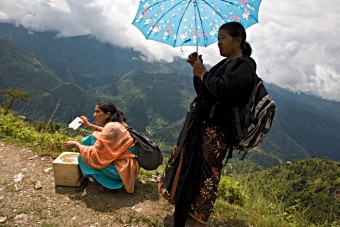Donors unite to finance Nepal health system

Village health worker Tilrupa Pokharel, accompanied by a neighbour, pauses on a mountain pass in Panchthar District, located in the foothills of the Himalayas Mountains in Eastern Nepal. Donor support is critical to resolving Nepal’s acute shortage of skilled health workers. Source: Khemka/UNICEF/2007.
The announcement in August scarcely registered beyond the walls of Nepal's Health Ministry in Kathmandu, but, at the Tamaghat Health Centre, 15 kilometres from the Chinese border and deep in the Himalayas, it was cause for celebration.
In an innovative agreement, called the Joint Financing Arrangement (JFA), GAVI and other leading donors had committed to chanelling funding for Nepal's new National Health Sector Plan through a common pool and to align their financial support with country mechanisms like national budget planning cycles.
"The health system has been improving gradually over the years, but now progress should go much faster," said Dr. Sabita Singh, the centre's chief medical officer, which treats some 60 patients a day in its small two-storey building.
Joint Financing Arrangement
The alignment of funding to our budget cycles will make funds more predictable and reduce the administrative burden. Dr. Baburam Marasini, Coordinator of the Health Sector Reform Unit in Nepal's Health and Population Ministry |
Under the terms of the JFA, the country's major donors - GAVI, UK Department for International Development (DFID), the World Bank, USAID, UNFPA, and UNICEF - will work within one management system, sharply reducing donor reporting requirements for Nepal.
In addition, the World Bank, DFID, and GAVI will pool their funding and allow the government to decide how it spends that money.
Health Systems Funding Platform
The JFA is the first sign of the Health Systems Funding Platform (HSFP), set-up earlier in the year by GAVI and other partners, successfully working in Nepal.
Initiated in 2004, the Platform aims to channel funds from GAVI, the Global Fund, and the World Bank, with facilitation by WHO, into national priorities and will channel their funds into national priorities and through integrated health plans.
"The alignment of funding to our budget cycles will make funds more predictable and reduce the administrative burden. This in turn will help make aid more effective as funds will be harmonised rather than fragmented," said Dr Baburam Marasini, Coordinator of the Health Sector Reform Unit in Nepal's Ministry of Health and Population.
Urgent attention
The financing agreement is specifically designed to support the National Health Sector Plan's five year vision for health system strengthening in Nepal -- in particular, improving access to maternal and child health services - such as immunisation coverage and safe childbirth in health facilities - and battling infectious diseases such as HIV AIDS and tuberculosis.
From 2003 to 2008, a Demographic and Health Survey showed that 49 percent of children under five had moderate or severe stunting.
"The new financial arrangement will help us in our planning and put resources to areas that really need it, such as improving the nutrition of children,'" said Dr. Sudha Sharma, Nepal's Secretary of Health and Population.
"Unless we work more on nutrition, we are likely to damage our existing successes."
Strong foundations
The agreement will build on the firm foundations of Nepal's heath sector. Even at the height of the country's recent 10-year conflict from 1996-2006, the delivery of health services was largely uninterrupted, even to remote, rural areas.
"We believed that the health system should be as neutral as possible during the conflict so that everyone had access to healthcare regardless of their side," said Dr Marasini.
Getting better
Back in Tamaghat, villagers stream into the Health Center. Some have pneumonia; a few are suffering toothache and others require information about contraceptives.
"The needs here are great, but we'll get better," said Dr. Singh.
